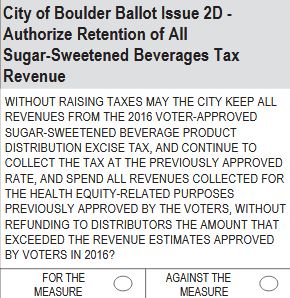Note: This article is part of a series of 2018 ballot issue analyses written for the Blue Line by author Richard Valenty. You can find coverage of the other 2018 ballot issues here. Ed.
Issue 2D is only necessary because of Article X, Section 20 of the Colorado Constitution, also known as TABOR. Under TABOR, ballot measures that include a tax increase must include an estimate of the total first-year revenue to be collected. If the actual revenue coming in exceeds the estimate, the public entity with jurisdiction must either refund the revenue above the estimate, or ask voters for permission to keep it. In this case, the public entity is the City of Boulder, and the issue is revenue collected as a result of the city’s 2016 voter-approved Sugar-Sweetened Beverage Tax (SSBT).
The 2018 SSBT collections are expected to reach about $5.2 million, or about $1.4 million above the estimate of $3.8 million. A “yes” vote for 2D would allow the city to keep this “excess” revenue, but if 2D fails, the revenue would be refunded to beverage distributors, not to individuals or families that purchased the beverages. This is because the SSBT is not a sales tax, since distributors of sugar-sweetened beverage products now pay the SSBT excise tax when they distribute these products within the City of Boulder. Also, if 2D fails, the current tax rate of two cents per ounce of sugar-sweetened beverages could be adjusted in the future.
The city uses SSBT revenue to fund health-related programs, designed to help people make healthy food and beverage choices, which in turn might help reduce or limit incidences of conditions such as obesity, tooth decay, or diabetes. The money goes into a Health Equity Fund, which has a Health Equity Advisory Committee for oversight, and readers can click this link to see a list of approved programs. In the world’s briefest nutshell, programs generally pertain to nutrition, exercise, availability of health care, and education about the value of healthy choices.
Voters might choose to base their 2D decision on how they perceive the value of the SSBT or associated programs. But a “no” vote would not end the SSBT, nor would it end the existing programs. The only things tangibly at stake are whether the city keeps or refunds the “excess” revenue, whether the revenue above $3.8 million would be available for additional or expanded programs, and potentially what the future tax rate might be.
The organization Healthy Kids, Healthy Boulder has formed a committee for this issue. As of Oct. 8, Healthier Colorado has already put $33,415 into the campaign. Also as of Oct. 8, Healthy Kids, Healthy Boulder was the only issue committee that had filed campaign finance reports with the City of Boulder for this election, for any city issue or question.
Issue 2D Pros and Cons
Pro
- If the city retains the revenue, it would be able to fund additional or expanded health-related programs, potentially reducing health impacts of sugary beverages, which was the intent of the original ballot measure.
- Estimating the likely revenue of a new tax is not exact science, so mandatory refunds might unfairly penalize the city or any entity for making a conservative estimate.
Con
- The amount of “excess” revenue is fairly large, so a refund to distributors is a fair remedy.
- The effectiveness of existing programs has yet to be proven, let alone the need for expansion with the “excess” revenue, so the city should work within the original estimate.



